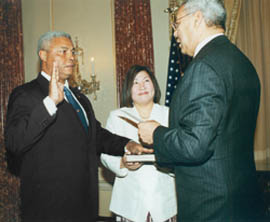Office of Internal Communications
|
March 23, 2006 FORMER U.S. AMBASSADOR BRINGS
During his 20-plus year career in the U.S. Department of State, Charles A. Ray has talked to kings, presidents, soldiers and human rights activists. Ray was U.S. Ambassador to Cambodia from 2002 to 2005, but he now serves as diplomat in residence at the University of Houston —speaking to students about foreign service. Ray is the second person to hold the position on campus. A native of Center, Texas, Ray served in the U.S. Army from 1962 to 1982 with tours around the world, including wartime service in Vietnam. After retiring from the Army in 1982, he joined the State Department, where he held several positions such as deputy chief of mission at the U.S. Embassy in Freetown, Sierra Leone. He also worked in the U.S. Consulate General Office in Guangzhou, China, and was the first U.S. Consul General in Ho Chi Minh City in Vietnam. Ray spoke about his experiences: Q What are your
responsibilities at UH? Q In the late
1960s and early 1970s, you served in the Army in Vietnam. What
were your duties there? Q You served as
the U.S. Ambassador to Cambodia and as U.S. Consulate General
in Guangzhou, China. What
was it like for an African-American diplomat in Asia, in China? I was the first African-American diplomat to penetrate certain parts of northeast China. I was the point man for the U.S. government in areas where people hadn’t seen an American since World War II. In 1985, China’s mind was somewhere back in the 1940s and 1950s as far as the world was concerned. For example, I spoke to a class of about 1,000 university students about life in the United States, circa 1985. After class, one student told me, ‘You can’t be American. In America, they don’t let people of your color do what you’re doing.’ So, it was fascinating to be able to go to these places and actually teach people who had this distorted view about the United States. Their view was if you’re American then you’re of European descent. If you’re dark, then you are either of African or Polynesian descent, and, therefore, you’re from the Third World. That view is less so now with the advent of CNN and the iPOD. But back then, the Chinese didn’t know what to make of me. Once, I went to a train station and asked for a ticket. I spoke Chinese, and the lady sold me a ticket. I was just about to get on the train when a sharp-eyed security guard recognized that I wasn’t Chinese. So, he pulled me aside because that was during the time China placed restrictions on where Americans could go and how they could travel. I don’t know whatever happened to the lady who sold me the ticket, but I don’t think she received a commendation for that. Q What are some
of your accomplishments during your tenure in the State Department? We also created the women’s movement. We watched thousands of Sierra Leone women, some of whom were illiterate, take to the streets. They ran polling places; they volunteered to count votes. They literally browbeat the men in that county into doing the right thing. In Cambodia, the United States and other nations were able
to talk that government into destroying its entire arsenal of
man-portable, ground-to-air missiles. The fear was that those
missiles would fall into the wrong hands. Cambodia is the only
Asian county to have surrendered those weapons. Q What has been
the response from faculty and students to your recruiting effort? Q What is your
advice to UH students and others interested in pursuing a career
in the foreign service? The U.S. image internationally has taken a nose dive in the
last few years. All of the sympathy we received after 9/11 has
been lost, and, according to some surveys, even the Canadians
are liking us less. Part of that is because we don’t bother
to learn about the world. That’s not healthy because we
are dependent on other countries, whether it’s for oil
or cheap shoes and clothes. If the world decides to cut us off,
we couldn’t survive. Q In your opinion,
what is the role of a university in terms of international relations? Editor’s note: Ray has received the State Department’s Superior and Meritorious Honor awards, the American Citizen’s Abroad’s Thomas Jefferson Award for outstanding support to the overseas American community, two Bronze Star medals from the Army and the Armed Forces’ Humanitarian Service Award. |
||||
